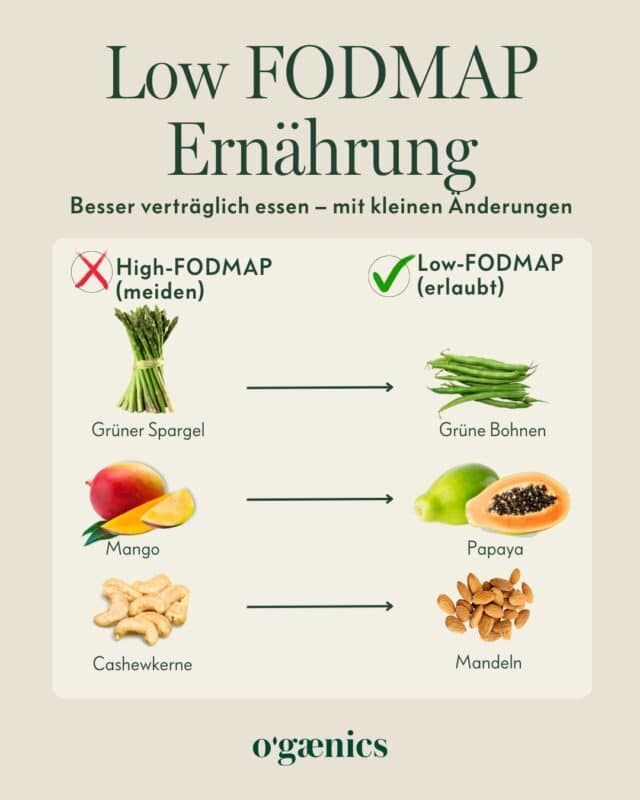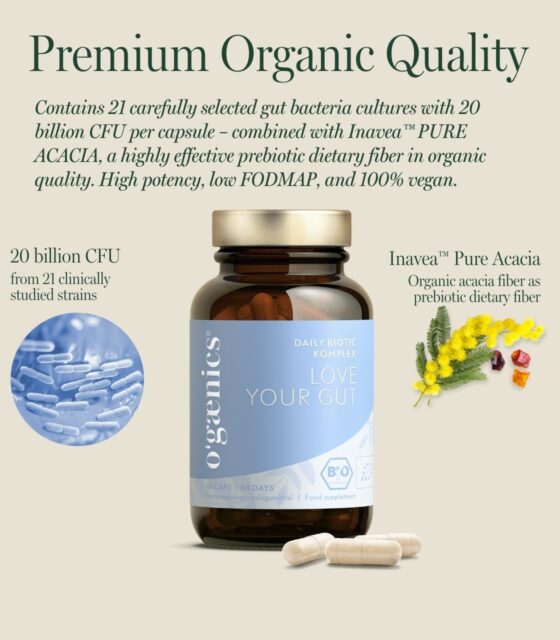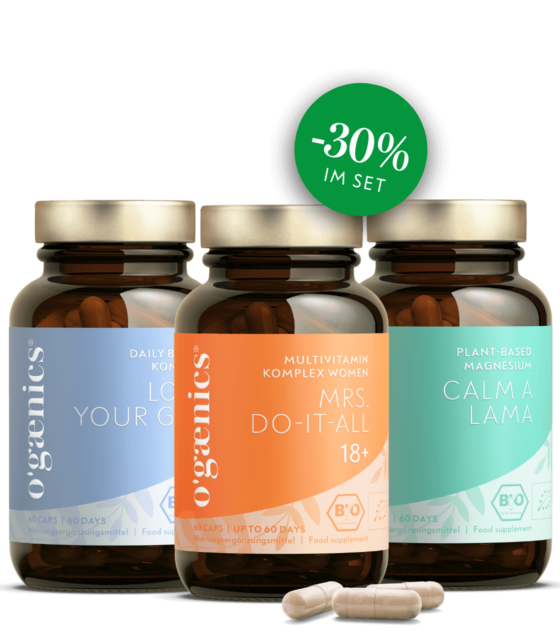Bloated belly despite a healthy diet? FODMAPs could be the cause.
Do you eat consciously, love fresh vegetables, plant-based products and eat mindfully – and yet your stomach doesn’t always cooperate? Do you experience bloating, discomfort or a feeling of fullness for seemingly no reason?
Then it’s time to take a closer look. Because even healthy foods can sometimes cause problems for the gut – if they contain so-called FODMAPs.
What are FODMAPs – and why do they play a role in digestive complaints?
FODMAP stands for fermentable oligosaccharides, disaccharides, monosaccharides and polyols – certain short-chain sugars that are poorly absorbed in the small intestine. Instead of being digested, they enter the large intestine, where they are fermented by bacteria – which leads to typical symptoms in sensitive people:
– Flatulence
– Abdominal pain or cramps
– Diarrhea or constipation
– Bloating
– Nausea
These symptoms often occur with a sensitive bowel (e.g. irritable bowel syndrome) – and significantly impair well-being. Studies show: Up to 74% of sufferers benefit from a low FODMAP diet. (PMID: 2407605)
The low FODMAP diet – a structured approach for lasting relief
The low FODMAP diet is not a trend diet, but a scientifically based concept that helps to recognize intolerances and relieve the intestines step by step:
1st elimination phase (4-6 weeks):
All FODMAP-rich foods are avoided in order to reduce acute symptoms.
2nd reintroduction phase:
FODMAP groups are systematically tested – so you learn what suits you individually.
3. long-term adaptation:
You develop a balanced eating style that is good for you and suitable for everyday life.
The result: more control, more energy – and a good feeling in your stomach.
What you should avoid during the elimination phase
Here is a practical overview of the most important high-FODMAP foods that you should avoid during the elimination phase:
| Food group | To avoid (examples) |
|---|---|
| Cereal products | Wheat, rye, barley (especially bread, pasta, baked goods) |
| Vegetables | Garlic, onions, cauliflower, asparagus, leek, artichoke |
| Fruit | Apples, pears, cherries, watermelon, plums, mango, peaches |
| Dairy products | Milk, yogurt, soft cheese (e.g. cream cheese, ricotta) due to lactose |
| Sugar & sweeteners | Honey, corn syrup, sorbitol, mannitol, xylitol, maltitol |
| Pulses | Lentils, chickpeas, beans, peas |
As you can see, there are also many high-FODMAP foods in a healthy, plant-based diet – knowledge helps here, not uncertainty.
Smart swaps for your everyday life
Just because you’re avoiding high-FODMAP foods doesn’t mean you have to give up indulgence. Here are a few simple FODMAP-friendly swaps that you can implement right away:
| Instead of | Better suited |
|---|---|
| Wheat bread | Spelt sourdough bread, gluten-free bread (e.g. rice, buckwheat, corn) |
| Garlic, onions | Green part of spring onions, chives, garlic oil |
| Cauliflower | Zucchini, eggplant, spinach |
| Apple, pear | Strawberries, blueberries, kiwi, pineapple |
| Milk, yogurt | Lactose-free milk, plant-based alternatives such as rice milk, almond drink, lactose-free yogurt |
| Soft cheese | Hard cheese (e.g. parmesan, cheddar) |
| honey | Maple syrup in small quantities |
| Lentils, beans | Small quantities of canned lentils (rinsed) or tofu |

Why a probiotic is important during the FODMAP diet
As you reduce your FODMAP intake, the amount of prebiotic fiber also decreases – which can affect the diversity of your intestinal flora.
Particularly affected: beneficial bifidobacteria. Studies show that a long-term low-FODMAP diet can change the microbiome (PMID: 28625832).
A specifically selected probiotic such as Love Your Gut can provide useful support here – gently, effectively and without the typical side effects of classic prebiotics such as inulin.
Love Your Gut – your reliable partner for sensitive gut health
- 21 clinically tested bacterial strains – incl. Lactobacillus plantarum and Bifidobacterium lactis for the targeted development of healthy intestinal flora,
- With inavea™ PURE ACACIA – a certified organic, low-FODMAP-certified prebiotic that is particularly well tolerated
- 100% organic, vegan, free from artificial additives
- Developed for people with sensitive digestion – ideal in combination with the FODMAP diet
Ogaenics accompanies you with the Love Your Gut Daily Biotic Complex as a partner at eye level – with well thought-out solutions for real needs.
-
Bestseller
Love Your Gut
Bio Daily Biotic Complex Premium for the gut: 21 bacterial strains plus organic fiberab 39,90 € -
Set Healthy You Gut Harmony
Fill your nutritional gaps, support stress resistance and skin health136,29 €194,70 €1.755,64 €1.228,94 € / kg
Practical tips for getting started
- Keep a food diary – and watch yourself carefully, not critically
- Drink enough – your gut loves fluids
- Relaxation is key: breathing exercises, yoga, nature
- Take your time – your body will give you clear signals if you learn to understand them
Start your journey to greater well-being and strong gut health now – with the FODMAP diet and Love Your Gut by your side!






 No products in the cart.
No products in the cart.